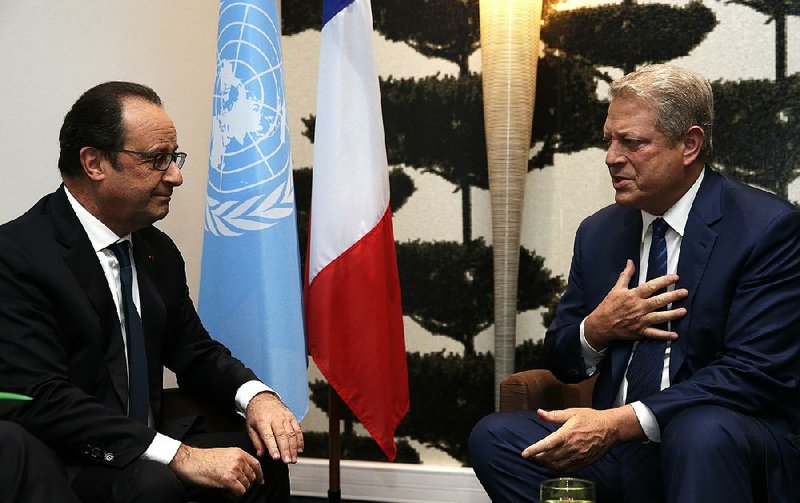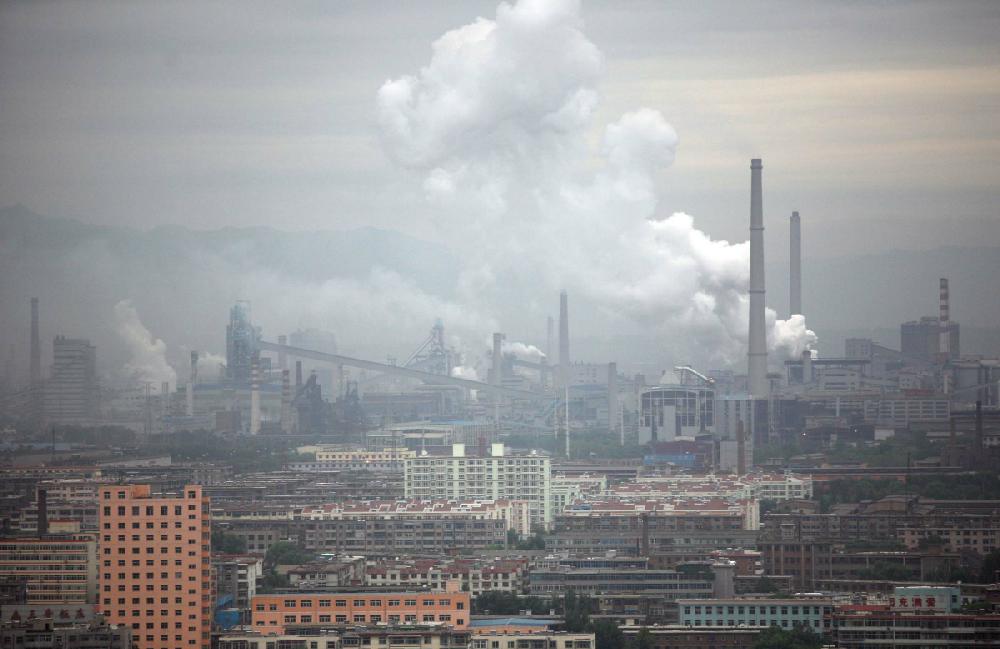PARIS -- Negotiators from nearly 200 countries adopted a draft text Saturday that left many issues unresolved before talks this week aimed at reaching a global agreement to fight climate change.
As the U.N. talks outside Paris reached their midway point, the 48-page draft agreement was sent along to environment and foreign ministers who will work on it this week.
"Major political issues must still be resolved," French envoy Laurence Tubiana said at Saturday's meeting. "It will take all our energy, intelligence, ability to compromise, ability to take a long-term view, to reach a result."
After years of discussion, many negotiators had hoped to accomplish more in the first week of the United Nations conference, which opened last Monday and is scheduled to end Friday. But they said there was still time to reach a deal to slow greenhouse-gas emissions.
"It's certainly not the agreement we're looking for in any number of ways," Todd Stern, the lead U.S. negotiator, said as diplomats were finalizing the draft Friday. But, he said, "I have high hopes it's an agreement we will like in the end."
Many disagreements remain, almost all related to defining the obligations and expectations of rich and poor countries, as well as those who don't fit neatly into either category. The draft had multiple options on that issue -- everything from who should pay for a global transition to clean energy to what happens to countries that miss their targets to fight climate change.
One proposal calls for an "international tribunal of climate justice" to deal with wealthy countries that don't fulfill their commitments. Rich nations are certain to reject that idea.
Leaders representing countries that account for more than 95 percent of global emissions arrived with proposals to reduce their output. But the plans fell short of the target of limiting temperature increases this century to 2 degrees Celsius above pre-industrial levels, the threshold at which scientists believe most of the worst effects of climate change could be avoided.
Some of the countries most vulnerable to the effects of climate change want to phase out the use of oil, coal and other fossil fuels. But countries whose economies depend on them are pressing for a more modest pledge to shift to a "low-carbon economy."
Even the widely agreed-upon target of 2 degrees Celsius, which equals 3.6 degrees Fahrenheit, is being debated. Negotiators from island nations threatened by rising sea levels are pushing for a goal of 1.5 C and are meeting stiff opposition from Saudi Arabia, among others.
"Anything less ambitious to say 2 degrees is catastrophic and will spell out the end disappearance of my own country," Prime Minister Enele Sosene Sopoaga of the Pacific island nation of Tuvalu said Saturday.
Many of the proposals on the table are conditional on financial support for developing nations struggling to cope with the effects of climate change and transition their economies to solar, wind and other renewable energy sources. But who pays and how much remain sources of contention.
Another issue that will need to be resolved is how to verify and measure whether countries live up to their commitments. Some developing nations -- including India and China, two of the world's biggest polluters -- don't want to be subject to as rigorous reporting as their wealthier counterparts.
That issue could be addressed by phasing in stricter requirement or providing financial support to developing countries to help them monitor emissions, said Duncan Marsh, director of international climate policy at the Nature Conservancy, a U.S. environmental group.
"This is always a very difficult point in the negotiations," said Marsh, who worked on climate issues for the State Department from 1997 to 2001. "This is when everyone is digging in their heels."
Although 184 countries already have submitted national plans to reduce what some say are climate-warming greenhouse-gas emissions, how to anchor those pledges in a legally binding deal remains to be worked out.
Chief Chinese negotiator Su Wei told reporters Saturday that "all the provisions, starting from the preamble to the final clauses, would be legally binding."
That contrasts with the U.S. position, which is for some parts to be legally binding, but not countries' pledges to limit the greenhouse-gas emissions. Binding emissions cuts likely would require President Barack Obama's administration to send the deal to the Republican-controlled Congress, where it likely would be struck down.
After the news conference, Su indicated the issue was still up for negotiation.
"We have to further discuss ... try to find some proper solution," he said.
"When you cook a meal, you need all the materials and ingredients in the kitchen," he said. "Everything must be there before you can make your meal. It's the elements of Parisian cuisine. We have many ingredients, and we will emerge with a good meal."
Al Gore, the Nobel laureate and former vice president whose 2006 documentary, An Inconvenient Truth, helped galvanize public attention on the effects of carbon emissions on the global climate, was a keynote speaker at "Action Day," a program of events Saturday on the sidelines of the Paris climate talks.
To back up his position the world must change its habits, Gore pointed to the deadly flooding in Chennai, India, last week; the four-year drought in California; and the recent water crisis in the region around Sao Paulo to stress the urgency of limiting global warming -- even though scientists have tended to avoid attributing particular weather events to climate change.
More than 70 percent of new electricity generation in the United States this year has come from solar and wind sources, he said. For the world, the figure is more than half.
"In the history of humanity there have been many great moral causes that have asked us to choose between what is right and what is wrong," Gore said, likening the fight against climate change to the struggles to end slavery, give women the right to vote, abolish apartheid, and prohibit discrimination on the basis of race and sexual orientation.
"For those who doubt that we have the political will to change, I ask you to always remember that political will is itself a renewable resource," he said.
Information for this article was contributed by Alexandra Zavis and Chris Megerian of the Los Angeles Times; by Arl Ritter and Sylvie Corbet of The Associated Press; and by Coral Davenport and Sewell Chan of The New York Times.
A Section on 12/06/2015

